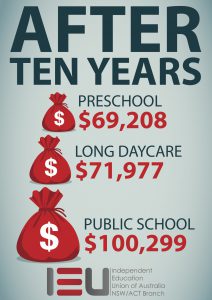Last month we shared a story on the startling $30,000 pay gap that exists between teachers who have the same kinds of degrees and same kinds of responsibilities: early childhood teachers, after 10 years of work, can expect to earn $30K less than their colleagues in primary schools.
Clearly, it struck a chord. The article shot instantly into Amplify’s statistics for the top 10 stories of all time and on Facebook alone it quickly reached more than 28,000 educators and has been shared more than 700 times.
I am embarrassed that as a single professional I am unable to afford a loan for a home.
IEUA claim
 Source: IEUA
Source: IEUA
Australia’s Independent Education Union (IEUA) provided the salary data to Amplify at the start of its Equal Remuneration Claim in the Fair Work Commission. This week they have shared additional insights into how that pay gap hurts teachers who choose early childhood education over a career in primary school.
Several of these teachers mention their very real concerns about the effect of the pay gap on their retirement income. In a profession that’s at least 95% female, early childhood teachers are already more likely to have lower superannuation balances than male counterparts because they are more likely to have time out on half-pay or no salary while at home with young children.
The disadvantage is even worse when compared with women with the same qualifications who work in the higher-paid primary education sector.
I am so poorly paid that in winter I cannot afford to use a heater.
Compare the superannuation
Using the ASIC Money Smart calculator, we entered examples of a preschool teacher, long day care ECT and primary school teacher’s salary at age 31, which is where most people will be 10 years after graduating.
If each of these hypothetical teachers had $25,000 in superannuation at that age, made no personal contributions, and retired at age 65, the primary school teacher would be at least $120,000 better off at retirement.
-
Preschool teacher final balance: $284,311
-
Long day care teacher final balance: $294, 697
-
Primary school teacher final balance: $400, 926
We can say ‘at least’ because, of course, by age 31 the primary teacher would already have a higher superannuation balance because of their higher income, and they would also be in a better position to make personal contributions to their superannuation and take advantage of various benefit schemes that large employers like government school departments can offer – leasing cars and laptops, for example.
I am angry that when I retire I will have a lot less superannuation thus I will be less comfortable financially than my colleagues who chose to teach in primary education.
[NOTE: this superannuation calculation is for illustration purposes only and was prepared by Amplify based on salary data provided by the IEUA and superannuation outcomes delivered by the Money Smart calculator]
Where’s the money going to come from?
Support for the IEUA’s equal remuneration case might have been overwhelming when we ran the first article LINK, but it was not unanimous. One member wrote to CELA to voice her dismay that higher wages for ECTs were being promoted when it could only lead to higher fees for families. Where would the money come from if not by putting even more pressure on families than they currently feel?
This isn’t a straightforward question with a single answer, but CELA CEO Michele Carnegie says her bottom line is that maintaining affordable fees is important but cannot come at the expense of educators’ wages and superannuation.
“In the end this all comes back to adequate funding for community based services in every part of Australia,” Carnegie said.
“We hope to see the IEUA succeed in getting recognition that early childhood and primary school teachers deserve equal remuneration, and governments respond with adequate funding to cover this vitally needed increase in salaries and professional recognition.
“There is no greater investment a government can make than in quality early years learning for children and particularly for the most disadvantaged children in our communities.
“We know two years of high quality preschool education makes an extraordinary difference in the lifelong outcomes for children who experience it – and the more difficult their home life, the more valuable their early years learning becomes.
“Qualified early childhood teachers should never have to face the choice between pursuing their professional passions or paying their electricity bills by leaving this part of the education sector.”
Real voices
Read on to see how these comments from early childhood teachers resonate with your experience, and share your thoughts with us in the comments or on the CELA Facebook page.
Mrs C
I am so poorly paid that in winter I cannot afford to use a heater.
Evie
How long I’ve worked in early childhood education: 19 years
I am embarrassed that my friends say I work harder than anyone they know and are aware that my pay does not reflect this.
I am embarrassed that my brother at the age of 17 earned more than I did in a traineeship than I did after 10 years in the [sector].
I am embarrassed that I earned more (more than double) working overseas as a governess.
I am embarrassed that as a single professional I am unable to afford a loan for a home.
I am deeply saddened by the exit of incredible teachers from the industry due to burnout and lack of recognition for what we do.
Antonella
I graduated with a Bachelor of Education (Early Childhood) but have been financially disadvantaged for selecting to choose my passion for the early childhood profession. This passion has not paid off long term. A bitter taste lies in my mouth lies when I think of the 18 full time years I have missed out on equal pay – how big is that financial gap?
Chris
For teachers heading closer to retirement like me the effect is compounded because lower wages have meant less ability to save for retirement or to put into superannuation.
For those at the start of their career they can see that this will add up to a big difference in superannuation by the time they retire, compared to teachers in school systems.
Michelle
I am still as passionate about early childhood but I am fed up with the lack of respect and recognition for us as teachers.
I am angry that when I retire I will have a lot less superannuation thus I will be less comfortable financially than my colleagues who chose to teach in primary education.
Meet the author

Bec Lloyd is the founder and managing director of Bec & Call Communication, providing professional writing, editing and strategy services to the school and early childhood education sector since 2014. In 2018 she launched UnYucky mindset and menus for happier family mealtimes. Formerly the communications lead at ACECQA and BOS (now NESA), Bec is a journo and mother of three who produces Amplify for us at Community Early Learning Australia.